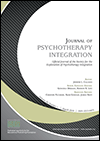Talking about climate change and eco-anxiety in psychotherapy: A qualitative analysis of patients’ experiences.
Psychotherapy, Vol 59(4), Dec 2022, 606-615; doi:10.1037/pst0000449 Citizens’ worries about climate change are often realistic and legitimate. Simultaneously, these worries can also become a source of distress so severe as to impair everyday functioning and prompt someone to seek psychotherapy. These emergent phenomena are often referred to as “climate anxiety” or “climate depression” by the […]



